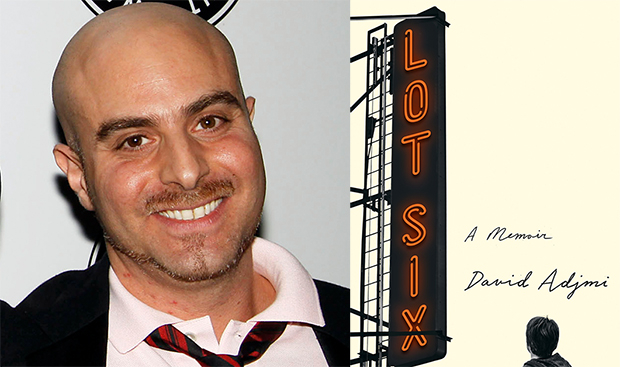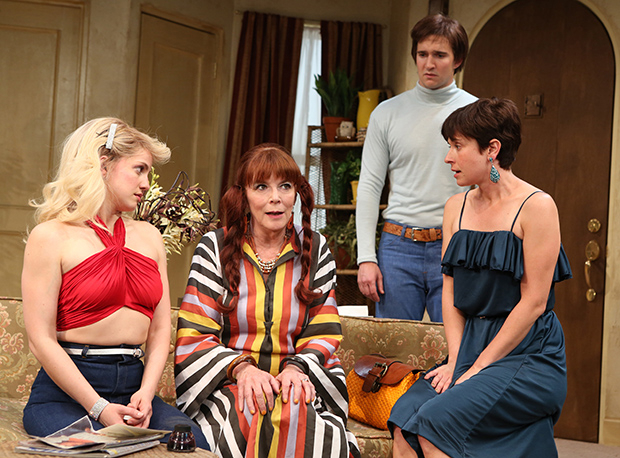Playwright David Adjmi on Crafting His New Memoir, Lot Six
Adjmi, the author of ”Stunning” and ”3C”, explores his life and how he became an artist in the book, which is out now.
Early in his new memoir, titled Lot Six, playwright David Adjmi describes one of the most formative memories of his childhood: going to see Sweeney Todd on Broadway at the age of 8. David didn't know what he was about to see onstage, and how different it would be from the TV commercial. His mother, who took him, certainly didn't expect that, either. "You think, 'Oh, it's this Broadway show, how crazy could it be,'" Adjmi told me. "And it's partly because it's presented this larger context of touristy musical theater that it's so shocking, and so affecting. I can't even explain how much that experience of sitting in the theater that day shaped me as a person."
Lot Six, out now from HarperCollins, explores Adjmi's adolescence, from growing up in a volatile Syrian-Jewish household in Brooklyn, to suppressing his homosexuality in an effort to fit in, to, eventually, trying to erase his family and reinvent himself as a theater artist. It's a deeply honest, piquantly funny, and genuinely moving coming-of-age tale by a playwright whose major works, including Stunning, 3C, and Marie Antoinette, share similar characteristics. Here, he discusses his writing process, telling his family about his book, and how the spirit of the legendary late actor Marian Seldes permeates every page.

(© Joseph Marzullo/HarperCollins)
How did you come to write Lot Six? Did you sit down and say "I'm gonna write a memoir" or did someone tell you should?
Neither. [laughs] When I did Stunning, an editor from HarperCollins, and, at the time, the executive editor, who's now the CEO, Jonathan Burnham, asked if we could meet. They had seen the play and read a profile about me and thought I could write a great memoir. I didn't know what they were talking about. I couldn't parse it. Eventually, we came up with this idea of my writing 10 essays about artists I admire, and the theme would be self-creation. I thought i would do some more intellectually rigorous, critical essays and show the world a different side of me, but as I kept writing, I realized that wasn't it. There was no skin in the game for me. I realized I had to go deeper into my life, but I didn't really think my life was substantive. It was Jonathan who said I should write about how I became a theater artist. So I found myself backing into it rather than going, "Wow, I would write an amazing memoir."
Was it hard to put your life on paper?
It was very, very hard and didn't come naturally to me. In the earlier drafts, I wasn't even a character. I wasn't trying to think about myself and be reflective. I can't even bear watching my plays, because they're very personal. I don't want to feel people watching me or watching something in my head. So the idea of, this is so raw and personal and vulnerable…But the way I did it was that I tricked myself. I thought I had to have integrity in the writing but I'll just cut it all later and they won't see it. But the artist in me got the better of me. This is testimony, so I have to be genuine and honest the way I am in my plays. I had to go all the way with it.
When did you tell your family that you were writing about them and your life?
Really pretty recently. [laughs] When I told my mother back in 2010 when I got the book deal, her only response was "uh-oh." But I spoke about it with her for the first time two weeks ago. I deferred it for as long as I could. I really didn't want her to read it, and I told her not to. But the book is dedicated to her and I think she gets enormous pleasure from that. So I said, "Why don't you just enjoy the dedication?" My sister has read it, she loved it. One of my brothers, we spoke about it in the fall when I was doing my legal read, because there was some stuff in there that my lawyer wanted me to talk to him about. But I don't think he's read it yet.
There's a very unclear moral line around memoirs, especially when you're writing about family and people that can be identified, even if you change their name. I know there's a tradition of it, but I'm never gonna be totally comfortable with it. In the end, I keep going back to this idea of testimony. I do feel that it's valuable to share, in a very honest way, your testimony. It's very useful for people to be able to share the contours of another person's life, who's had it kind of hard, and to be able to map out your own experiences against someone else's. That's all I ever did. That's how I built myself. I wanted to give that to other readers who needed it.
Did the legal situation with 3C, where the rights holders for Three's Company tried to get the play stopped for what they called copyright infringement, affect your writing process here at all? Did it make you cross your T's in a different way?
It really didn't. I can't think that way. My compass is really not fear-based and it's not about worldly ramifications. If it was, I would have chosen a different career. It's solely about the integrity of the work for me, but I have to do it with blinders on and pretend it isn't going to come out. But every memoir gets legal vetting, and my lawyer and I had a series of conversations about what I could put in. There was stuff in there where I was like, "Do I need this for the story?"And I didn't absolutely need it, I would cut it. There was other stuff that I fought for, too.

(© Joan Marcus)
You say in the acknowledgments that the spirit of Marian Seldes permeates the book. I want to talk about her and the affect she had on your life and work. She's a real hero of mine.
We never fully worked together. We did a bunch of readings of my play Elective Affinities. We had planned to do it for many years. When Sarah Benson said that she wanted to do it at Soho Rep, I called Marian and told her and she just said, "David, I'm old." I'll never forget the way she said that. "I'm too old." It was heartbreaking.
But she's somebody who was sort of like a spiritual ribbon that floated around me. She was like that for everybody. She was just a mensch. There was something regal and royal and soigné about her. But she was also very much a woman of the people. She was very humble in the way that she participated in society. She was a worker and always saw herself in service of others. But she really knew her own worth. She nominated me for a prize, and it was given out at one of those places like the Player's Club. And at some point, Marian made a speech and said, "These are the people of the future." We all got up onstage and she said our names and everybody clapped, and then there was a beat and she said "Alright, sit down now, darlings. Your moment's over." It was so cute. She was just the best. I miss her all the time.
I've read that you've got a Broadway project coming up. Is that still in the cards? Can you talk about it?
I had a play that was supposed to open on Broadway in March 2021. Daniel Aukin is directing it. Will Butler, from the band Arcade Fire, has done all the music. It's a four-act play with music about a band recording an album all through the middle '70s. It's very unclear what the situation is going to be. Maybe we could push it to later. There's a lot of enthusiasm around it and I'm very excited about it. I think it's the best thing I've ever done.







